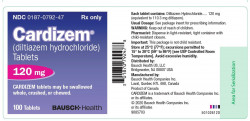Cardizem (diltiazem) Coupons, Discounts & Cost
Cardizem (diltiazem) is a medication with antiarrhythmic, antihypertensive and anti-anginal activity. One way to save money on the Cardizem (diltiazem) retail cost regardless of income and insurance status is to use Cardizem (diltiazem) coupons or discount cards from RXCoupons. Use this Cardizem (diltiazem) coupon at this online pharmacy and receive up to 75% off the sale price.
What is Cardizem (diltiazem)?
Cardizem (diltiazem) is a medication with antiarrhythmic, antihypertensive and anti-anginal activity. Cardizem tablets include diltiazem as an active ingredient. The drug reduces myocardial contractility, slows heart rate, reduces myocardial oxygen demands, and regulates coronary blood flow. Diltiazem helps improve oxygen delivery to the myocardium.
Cardizem (diltiazem) indications
Cardizem (diltiazem) is recommended in patients with hypertension, angina attack (including Prinzmetal angina), supraventricular arrhythmias (including paroxysmal supraventricular tachycardia, atrial fibrillation).
Cardizem (diltiazem) contraindications
Cardizem (diltiazem) is not used in case of functional disorders of the kidneys and liver, severe bradycardia, second- and third-degree heart block (except for pacemaker patients), cardiogenic shock, sick sinus syndrome, arrhythmia associated with Lown-Ganong-Levine syndrome, hypotension, hemodynamically significant aortic stenosis, acute heart failure, pregnancy and lactation, hypersensitivity to the drug.
Cardizem (diltiazem) is used with caution in patients with hypotension, in children (due to lack of clinical data on safety or efficacy of the drug), in elderly patients, as well as in patients with significant left ventricular dysfunction, intraventricular conduction disturbances, congestive heart failure, hepatic and renal failure.
Cardizem (diltiazem) dosage
Cardizem (diltiazem) tablets should be taken whole (drink fluids right after swallowing). The drug is taken three times a day at a dose of 60 mg or 2 times daily at a dose of 90 mg.
The optimal dose of diltiazem is 180-360 mg per day.
Cardizem (diltiazem) side effects
Cardizem (diltiazem) may cause unwanted side effects:
Cardiovascular system: high blood pressure, arrhythmia, angina pectoris, bradycardia (heart rate less than 50 beats per minute) or tachycardia, heart failure.
Diltiazem in high doses: bradycardia, atrioventricular block, congestive heart failure, low blood pressure.
Nervous system: depression, headache, drowsiness, dizziness, asthenia, fatigue, sleep disturbances, anxiety, extrapyramidal disorders (ataxia, tremor).
Diltiazem in high doses: tremor, paresthesia, visual disturbances (transient visual loss).
Hematopoietic system: agranulocytosis, thrombocytopenia.
Digestive system: vomiting, increased appetite, dry mouth, nausea, diarrhea or constipation, gingival hyperplasia (pain, bleeding, swelling).
Cardizem (diltiazem) drug interactions
Potentially dangerous combinations with Cardizem (diltiazem): quinidine and other class I antiarrhythmic drugs, beta-blockers, cardiac glycosides (high risk of bradycardia and decreased myocardial contractility). Diltiazem may cause undesirable effects when used with certain drugs: procainamide, quinidine, thiazide diuretics and other medicines to lower high blood pressure, inhalational anesthetics, propranolol, diazepam, phenobarbital, cyclosporine, theophylline, carbamazepine, valproic acid, digoxin, cimetidine, indomethacin and other non-steroidal anti-inflammatory drugs, steroids and sympathomimetic drugs, lithium drugs (may cause vomiting, nausea, ataxia, diarrhea, tremor, and/or tinnitus), general anesthetics.
Cimetidine slows down the excretion and increases the duration of action of diltiazem.
Diltiazem may be combined with nitrates.
Cardizem (diltiazem) overdose
Symptoms: bradycardia, atrioventricular conduction abnormalities, hypotension. Treatment: gastric lavage, activated carbon, symptomatic treatment (atropine, isoproterenol, dopamine, dobutamine).
Cardizem (diltiazem) special instructions
Patients should consult a doctor before starting diltiazem therapy, as well as in cases of serious side effects.
The drug should be prescribed with caution to patients with hypotension, bradycardia, intraventricular conduction disorders, as well as to elderly patients, patients with impaired liver and kidney function.
Patients should avoid alcohol during the whole period of treatment.
The drug can affect a driver's attentiveness, perception of time and speed (avoid driving during the treatment).
Cardizem (diltiazem) conditions of storage
Store in a place inaccessible to children, at temperature up to 25° C.

